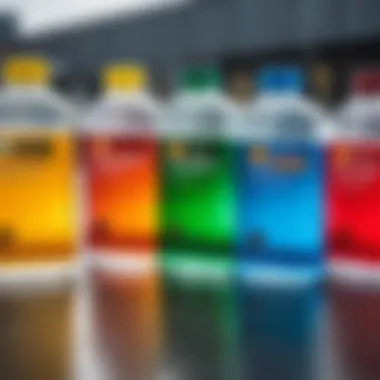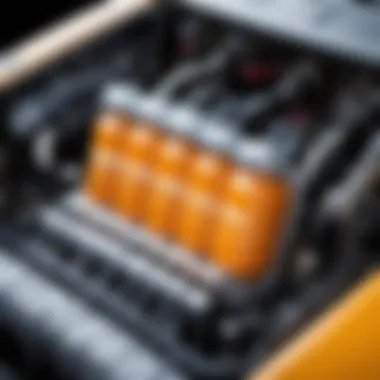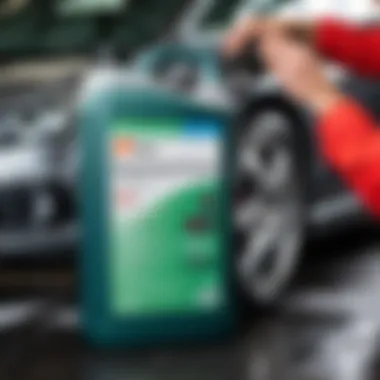Choosing the Best Antifreeze for Your Solaris Vehicle


Intro
Choosing the right antifreeze is critical for the longevity and performance of your Solaris vehicle. Many vehicle owners often overlook the significance of antifreeze, leading to various issues in engine performance and longevity. This article aims to clarify the essential factors surrounding antifreeze selection, including the different types available, their chemical composition, and compatibility with Solaris engines. Understanding these elements can lead to more informed maintenance practices.
Обзор автомобиля
Solaris vehicles are well-regarded for their reliability and efficiency. The understanding of the vehicle's specifications and engine types is fundamental in choosing the correct antifreeze.
Основные характеристики
Solaris vehicles come equipped with advanced features that enhance performance and comfort. These include modern engine designs, fuel efficiency technologies, and various safety systems. All these features require optimal operating conditions, which antifreeze helps to maintain by regulating temperature and preventing corrosion.
Описание двигателей и трансмиссий
Solaris vehicles typically utilize a range of engines, from compact four-cylinders to more powerful six-cylinder options. Each engine type has its own requirements for antifreeze, especially in terms of performance and temperature regulation. The compatibility of antifreeze with the specific engine type affects not just performance, but also the vehicle's overall lifetime. As a result, knowing what antifreeze is best for these engines is important.
Выбор автозапчастей
The selection of antifreeze is also a question of choosing the right parts. Serious vehicle enthusiasts must understand the different kinds of antifreeze available in the market and how they relate to their Solaris.
Разновидности запчастей
There are generally two types of antifreeze: ethylene glycol and propylene glycol. Their properties differ in terms of toxicity, performance, and required maintenance. Ethylene glycol is more commonly used due to its superior thermodynamic properties. However, it's critical to check the engine specifications when selecting the antifreeze.
Как выбрать качественные запчасти
Choosing quality antifreeze goes beyond just brand names. Factors like boiling and freeze point, pH level, and corrosion inhibition should be considered. Vehicle manufacturers usually specify the correct antifreeze; consulting the Solaris owner's manual can provide crucial insights. Always consult reputable sources or mechanics to understand whether a product is suitable.
"Proper antifreeze selection ensures your vehicle runs smoothly and efficiently, safeguarding your investment."
In summary, a well-informed antifreeze choice for your Solaris can lead to improved performance and longevity. Keep in mind the specific needs of your vehicle, and don't hesitate to seek expert advice if needed.
Understanding Antifreeze
Antifreeze is a crucial component in maintaining the performance and longevity of your Solaris vehicle. Understanding antifreeze is not merely a technical necessity; it ensures that the engine operates optimally in varying climate conditions. As the engine runs, it generates heat, and the antifreeze plays a vital role in regulating this temperature. The right antifreeze can protect your engine from overheating during hot weather and prevent freezing in cold conditions.
In this section, we will explore the definition of antifreeze, its purposes, and the key components that make it effective.
Definition and Purpose
Antifreeze, commonly referred to as coolant, is a liquid mixture composed primarily of water and various additives. Its main purpose is to regulate the engine temperature by absorbing heat from the engine and dissipating it through the radiator. Additionally, antifreeze serves other essential functions:
- Prevention of freezing: It lowers the freezing point of the coolant.
- Corrosion protection: It protects internal engine components from rust and corrosion.
- Boiling point elevation: It raises the boiling point, which helps the engine run effectively even in high temperatures.
Understanding these objectives of antifreeze enables vehicle owners to make informed choices.
Key Components of Antifreeze
Antifreeze is not a single substance but a blend of various chemical components. Each plays a specific role in ensuring the effective performance of the coolant. The primary elements of antifreeze include:
Ethylene Glycol


Ethylene glycol is perhaps the most common base for antifreeze products. It is favored for its ability to lower the freezing point significantly, allowing the fluid to remain liquid in very cold conditions. The key characteristic of ethylene glycol is its efficacy in preventing the formation of ice in the engine. However, while it is effective, it is also toxic. This toxicity is a crucial disadvantage, as exposure can pose health risks to humans and animals.
Propylene Glycol
Propylene glycol is another type of antifreeze. This compound is often considered safer than ethylene glycol because it is less toxic. This key characteristic makes propylene glycol a preferred choice for applications where human interaction is more likely. Its ability to lower freezing points is adequate, but it may not be as efficient as ethylene glycol in extreme conditions. Thus, propylene glycol provides a unique benefit of safety versus performance in colder climates.
Corrosion Inhibitors
Corrosion inhibitors are additives that play a significant role in antifreeze formulations. Their primary function is to protect metal components within the engine from oxidization and degradation over time. This aspect is vital, as rust and corrosion can lead to costly repairs and reduced performance. The use of corrosion inhibitors enhances the longevity of the antifreeze itself and ensures that the engine maintains its efficiency. The unique feature of these inhibitors lies in their ability to form a protective layer on metal surfaces, thus safeguarding the integrity of engine components.
"Choosing the right antifreeze not only enhances performance but also ensures the longevity of your vehicle."
Understanding the components of antifreeze helps Solaris owners make better decisions regarding cooling fluids. Each ingredient contributes to the overall effectiveness of the antifreeze, laying the foundation for optimal engine performance.
Types of Antifreeze
Understanding the different types of antifreeze is crucial for Solaris owners. Various formulations exist, each designed to cater to specific engine requirements and operating conditions. The selection of the correct antifreeze not only ensures efficient engine cooling but also assists in preventing corrosion and extending the lifespan of the vehicle’s components.
Conventional Antifreeze
Conventional antifreeze is often the most recognizable type. This formulation primarily uses ethylene glycol as its base. It has been a popular choice for years due to its proven effectiveness in lowering the freezing point and raising the boiling point of engine coolant.
One of the key benefits of conventional antifreeze is its cost-effectiveness. It is readily available and can be mixed with water, which enhances its cooling properties. However, there are some notable considerations. Ethylene glycol is toxic, which poses a risk if there are leaks. Additionally, conventional antifreeze tends to break down faster over time, which requires more frequent replacement.
Organic Acid Technology (OAT)
Organic Acid Technology antifreeze marks a significant advancement in cooling formulations. Unlike conventional types, OAT relies on organic acids as its primary corrosion inhibitors. This can result in a longer lifespan for the antifreeze, often lasting up to five years under normal operating conditions.
The main advantage of OAT is its effectiveness. It can provide superior protection against rust and corrosion while maintaining thermal efficiency. It is also less toxic than conventional antifreeze. However, OAT is not interchangeable with other types. Mixing it with conventional antifreeze can negate its benefits and lead to reduced performance. Therefore, it is vital for Solaris owners to check for compatibility with their vehicle’s specifications.
Hybrid Organic Acid Technology (HOAT)
Hybrid Organic Acid Technology combines features from both conventional and organic acid antifreezes. HOAT typically incorporates a blend of organic acids with traditional inorganic corrosion inhibitors. This dual approach aims to provide the best of both worlds—longer life and effective corrosion protection.
HOAT serves as a versatile option, often being compatible with both older and newer engine types. Solaris owners might find it particularly beneficial due to its balance of performance and cost. Nonetheless, it is critical to refer to the vehicle's manual for specifications to ensure compatibility, as not all HOAT products are alike.
In summary, the choice of antifreeze can significantly influence the cooling system's performance and longevity in your Solaris. When selecting among conventional, OAT, and HOAT antifreezes, it’s important to consider engine specifications and compatibility. Thorough understanding can optimize vehicle performance and mitigate potential risks.
Antifreeze Compatibility with Solaris
Ensuring antifreeze compatibility with your Solaris is crucial for optimal engine performance. Using the right antifreeze not only protects the engine from freezing and boiling but also provides essential corrosion protection for critical engine components. It is vital to refer to manufacturer recommendations to avoid potential issues that may arise from incompatible fluids. This section will address the importance of adhering to these specific guidelines and the consequences of overlooking them.
Manufacturer Recommendations
Automobile manufacturers provide clear guidelines regarding the types of antifreeze that are best suited for their vehicles. These recommendations are based on extensive testing and engineering analysis. For Solaris vehicles, it is advisable to consult the user manual or manufacturer’s website to understand the precise type and specifications of antifreeze required.
Ignoring these recommendations can result in serious engine damage over time. Different formulations of antifreeze can react poorly with various materials in the engine, leading to leaks, overheating, and even complete engine failure. Therefore, adhering to the manufacturer's specifications is not merely a suggestion; it is a necessary step to prolong the life and efficiency of your vehicle.
Understanding Compatibility Issues
Mixing Different Types
Mixing different types of antifreeze is a common practice among vehicle owners, often out of convenience or a desire to extend the life of what is available. However, doing so can lead to significant compatibility issues. Each type of antifreeze has its unique chemical compounds designed to work within specific parameters of temperature and pressure.


When different types are mixed, such as organic acid technology (OAT) with traditional green antifreeze, it can result in a gelatinous substance that clogs the cooling system. This can lead to overheating and potential engine failure. Therefore, it is essential to avoid mixing antifreeze formulations without understanding their chemical properties and compatibility. The risks associated with mixing types far outweigh any temporary convenience.
Avoiding Contamination
Avoiding contamination is vital in maintaining antifreeze's effectiveness. Contamination can occur through cross-use of tools, pouring from unclean containers, or even when antifreeze is exposed to other automotive fluids. Once antifreeze becomes contaminated, its protective properties diminish, leading to accelerated deterioration of the engine's internal components.
The key characteristic of preventing contamination is vigilance in maintenance practices. Ensure all tools used for maintenance are clean and free from residue. Using only the recommended antifreeze formulations and avoiding mixing different products reduces the likelihood of contamination occurring. This practice is beneficial as it preserves the integrity of the engine and contributes to smoother operation over the lifespan of the vehicle.
Important Note: Always use antifreeze that meets or exceeds the specifications outlined by the manufacturer for your Solaris.
Addressing antifreeze compatibility comprehensively ensures that Solaris owners can make informed decisions. By understanding manufacturer recommendations and the implications of mixing different antifreeze types, vehicle owners can maintain engine health and performance effectively.
How to Choose the Right Antifreeze for Solaris
Choosing the correct antifreeze for your Solaris is an essential process that impacts both the longevity and performance of your vehicle. The antifreeze acts as a coolant, regulating temperature and preventing engine damage due to freezing or overheating. Understanding how to choose the right antifreeze is not just about maintaining optimal performance; it also involves considering specific vehicle requirements and environmental factors. Making the right choice ensures that your Solaris remains in good condition over its lifespan.
Assessing Vehicle Specifications
Before selecting an antifreeze, it is crucial to examine the specific requirements of your Solaris model. Each vehicle may have different engine designs that dictate the type of coolant it needs. Referring to your owner's manual provides insight into the recommended antifreeze type, including its chemical composition and necessary additives.
It is also important to consider factors like the cooling system's materials. For example, vehicles with aluminum components may require specific antifreeze formulations to prevent corrosion. Failure to adhere to these specifications can result in damage, potentially leading to costly repairs. One cannot underestimate the significance of this step, as it lays the groundwork for subsequent coolant selection.
Evaluating Climate Conditions
Climate plays a vital role in determining the type of antifreeze required for your Solaris. Different regions experience varying temperature extremes, which can impact engine performance. In areas with severe winters, a lower freezing point antifreeze is essential to prevent the coolant from freezing and jamming the engine. Conversely, in hotter climates, higher boiling point antifreeze ensures that the coolant does not evaporate before effectively cooling the engine.
When considering climate, take into account not only the average seasonal temperatures but also fluctuation patterns and unusual weather events. If your Solaris operates in a multifaceted environment that fluctuates between hot and cold, a versatile antifreeze with a balanced formulation may be necessary. This evaluation of climate conditions ensures your vehicle's cooling system remains efficient and effective no matter the weather occasion.
Cost vs. Quality Considerations
The relationship between cost and quality is a critical component in selecting the antifreeze for your Solaris. While it may be tempting to choose a less expensive product, this could compromise the overall health of your vehicle. Cheaper antifreezes may lack essential components, potentially leading to system damage or decreased performance in the long run.
Investing in high-quality antifreeze can result in lower maintenance costing, better protection against temperature extremes, and enhanced longevity. Evaluate the cost in the context of the benefits gained. It is wise to seek reputable brands that offer proven formulations recognized for their reliable performance. Reading reviews and comparing products can provide valuable insight into which antifreezes deliver the best balance of cost and efficacy.
Remember, the antifreeze you choose has long-term effects on your Solaris. Prioritize the right balance of cost and quality to protect your investment.
In summary, making informed decisions when choosing antifreeze for your Solaris can significantly impact the vehicle's performance and durability. By assessing vehicle specifications, evaluating climatic conditions and weighing cost against quality, you ensure select the most effective antifreeze for your car.
Antifreeze Maintenance and Replacement
Antifreeze maintenance and replacement are vital practices for any Solaris owner. Proper management of antifreeze fluid ensures engine protection and efficiency. Over time, antifreeze can degrade, losing its effectiveness. Its role in preventing overheating, protecting against corrosion, and maintaining optimal temperature is critical. Thus, understanding how to properly check and maintain antifreeze levels can extend the lifespan of your Solaris engine.
Fluid Level Checks
Regular fluid level checks are essential in antifreeze maintenance. Monitoring levels helps prevent overheating, which can cause severe engine damage. Ideal antifreeze levels ensure adequate heat transfer and thermal regulation. It is advisable to check the level at least once a month, or more often in extreme climates.
- Locate the Coolant Reservoir: Your Solaris will have a designated area for antifreeze. This is usually a translucent tank.
- Examine the Levels: The reservoir typically has markings indicating maximum and minimum levels. Ensure the fluid is between these markers.
- Top Up If Necessary: If the fluid is low, you should add the appropriate antifreeze mixture to maintain required levels.
Signs of Degradation
Recognizing signs of degradation in antifreeze is crucial for vehicle health. There are two main indicators: color changes and sediment presence. Both signs can indicate that antifreeze has lost its protective properties.
Color Changes


Color changes in antifreeze should not be overlooked. Typically, fresh antifreeze has a clear or vibrant hue. A noticeable shift in color can signify contamination or chemical breakdown.
- Key Characteristic: Fresh antifreeze comes in various colors: bright green, orange, or even pink, depending on the type used.
- Importance: Change in color often indicates the presence of rust, scale, or other contaminants.
- Benefits: Identifying color changes early allows for timely maintenance, preventing costly repairs in the long run.
Sediment Presence
Sediment presence is another critical sign of antifreeze degradation. If you notice particles in the antifreeze, it usually means that corrosion has occurred within the cooling system.
- Key Characteristic: Sediment may present itself as a cloudy substance or flakes floating in the fluid.
- Importance: Sediment can clog passages in the cooling system, impairing its effectiveness.
- Advantages/Disadvantages: While spotting sediment may prompt immediate action and care, ignoring it can lead to significant engine issues and costly repairs.
Regular checks and maintenance can save Solaris owners from extensive repairs. Keep an eye out for signs of aging antifreeze, and act swiftly.
In summary, antifreeze maintenance and timely replacement are paramount for optimal performance in your Solaris. Understanding fluid levels and monitoring visual signs of degradation can keep your vehicle healthy, prolonging its life and ensuring reliable performance.
Common Misconceptions About Antifreeze
Antifreeze plays a crucial role in the operation of your Solaris vehicle, yet many drivers hold certain misconceptions that can lead to poor choices. Understanding what is true and what is not regarding antifreeze can help you make more informed decisions, ultimately protecting your engine and ensuring optimal performance.
Impact of Antifreeze Color
Many vehicle owners assume that the color of antifreeze indicates its effectiveness or suitability for their engines. In reality, the color may vary based on the type of additives used in formulation. Common colors include green, orange, and pink, but these colors do not inherently signify quality. Instead, they represent the underlying chemistry of the fluid, such as the type of corrosion inhibitors or the base fluid used. For instance, an orange coolant may contain organic acids, while a green coolant could be older, conventional formulations.
Being misled by color could result in selecting a product incompatible with your vehicle's requirements. Always refer to the manufacturer’s specifications for the correct antifreeze type needed for your Solaris, rather than relying solely on color.
The Myth of Year-Round Use
Another prevalent misconception is that a specific type of antifreeze can be used year-round in all conditions. This is not accurate. Different climates demand different formulations. For example, areas with extreme temperatures require antifreeze with a higher freeze point and the right boiling point to prevent overheating. Using only one type may lead to performance issues and can increase the risk of engine damage over time.
Moreover, some antifreeze formulations degrade faster in certain environments, making regular checks and potential replacement crucial. Just because a product is marketed for all seasons does not mean it will perform adequately in every scenario.
"Antifreeze is essential for engine longevity; do not fall for common myths that may compromise your vehicle's performance."
In summary, addressing these common misconceptions ensures that Solaris owners take the necessary precautions when selecting antifreeze. Understanding the limitations regarding color and seasonal use allows for better maintenance strategies, ultimately prolonging the lifespan of your engine.
Finale
The conclusion is a critical element in this article as it brings together all the concepts discussed and reaffirms their importance. For Solaris owners, understanding the choice of antifreeze is not just about maintaining optimal engine performance; it is about ensuring longevity and reliability in a vehicle.
As we have examined various types of antifreeze, their key components, and compatibility issues with Solaris engines, it is clear that making informed choices can prevent costly repairs in the long run. Antifreeze serves as a vital fluid that not only protects the engine from extreme temperatures but also prevents corrosion and deposits within the cooling system. This is crucial for maintaining the health of the vehicle.
Furthermore, the maintenance practices and debunking of misconceptions around antifreeze usage help clarify many doubts that vehicle owners may have. Knowing the right product to use, along with regular maintenance checks, can significantly enhance one’s driving experience.
Ultimately, taking into account the specifics highlighted throughout the article ensures that Solaris owners can enjoy their vehicles fully, without the underlying worry of overheating or engine damage.
Summarizing Key Points
- Choose antifreeze based on vehicle specifications and manufacturer recommendations.
- Understand the unique properties of different antifreeze types: Conventional, OAT, and HOAT.
- Compatibility with Solaris is essential to avoid mixing issues and ensure optimal performance.
- Regular maintenance checks can help detect early signs of antifreeze degradation.
- There are common misconceptions to be aware of, especially regarding color and seasonal use of antifreeze.
The synthesis of these key points reinforces the necessity for Solaris owners to be diligent in their choices regarding antifreeze.
Final Recommendations for Solaris Owners
- Read Manufacturer Guidelines: Always refer to the vehicle's manual for specific antifreeze recommendations. This can save time and money.
- Regular Fluid Checks: Monitor the antifreeze levels and condition frequently. Look for signs of contamination, like cloudy appearance or sediment.
- Choose Quality Products: Invest in high-quality antifreeze that meets the standards for your Solaris. While lesser-known brands may appear cheaper, they can compromise engine health.
- Stay Informed: Keep up with the latest developments in antifreeze technology and maintenance practices. Engaging with reputable online forums such as reddit.com can provide additional insights from experienced mechanics and car enthusiasts.
Understanding the right antifreeze for your Solaris is crucial in ensuring your vehicle performs at its best for years to come.
By adhering to these recommendations, Solaris owners will be better equipped to navigate their antifreeze needs effectively, leading to improved vehicle performance and reliability.







